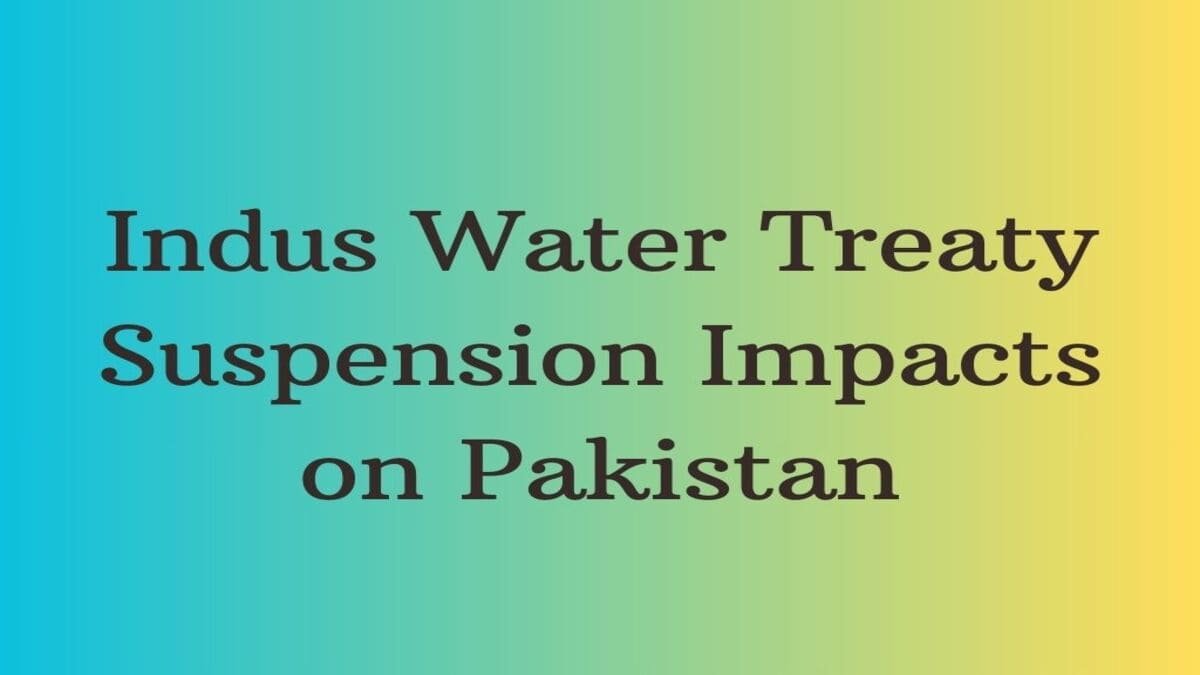Indus Water Treaty Suspension Impacts on Pakistan, The Indus Water Treaty has been a cornerstone of water-sharing agreements between India and Pakistan since its signing in 1960. Indus Water Treaty Suspension Impacts on Pakistan Recently, the decision by India to suspend this treaty has sparked significant concern, particularly regarding its impact on Pakistan. This article delves into the Indus Water Treaty suspension, its implications for Pakistan, and the broader geopolitical ramifications, while addressing key questions like what is Indus Water Treaty, Indus Water Treaty means, and what is Indus Water Treaty between India and Pakistan. By exploring the treaty’s history, its suspension, and its effects, we aim to provide a comprehensive.
What is Indus Water Treaty?
The Indus Water Treaty is a water-sharing agreement signed on September 19, 1960, between India and Pakistan, brokered by the World Bank. It governs the distribution of waters from the Indus River and its five tributaries: Jhelum, Chenab, Ravi, Beas, and Sutlej. The treaty allocates the three eastern rivers (Ravi, Beas, and Sutlej) to India for unrestricted use, while the three western rivers (Indus, Jhelum, and Chenab) are primarily allocated to Pakistan, with India allowed limited non-consumptive uses, such as hydropower generation. This agreement, often referred to as the Indus Valley Water Treaty, has been hailed as one of the most successful transboundary water treaties, surviving multiple conflicts between the two nations.
READ MORE- Baisaran Valley Pahalgam Attack 2025
The Indus Water Treaty means a framework for equitable water distribution, ensuring both countries can meet their agricultural and economic needs. It established the Permanent Indus Commission, with representatives from both nations, to resolve disputes and facilitate cooperation. Despite its success, recent tensions have led to India’s decision to suspend the treaty, raising questions about its future.
Indus Water Treaty Suspension Impacts on Pakistan: A Turning Point
On April 23, 2025, India announced the temporary suspension of the Indus Water Treaty following a terrorist attack in Pahalgam, Jammu and Kashmir, which killed 26 Indian tourists. The Indian government, citing national security concerns, decided to halt the flow of water from the western rivers to Pakistan, marking a significant shift in bilateral relations. This move, described as holding the treaty “in abeyance” until Pakistan addresses cross-border terrorism, has profound implications for both nations, particularly Pakistan, which relies heavily on the Indus River system.

The Indus Water Treaty suspension is not the first time India has considered altering the agreement. In 2016, after the Uri attack, Prime Minister Narendra Modi famously declared, “Blood and water cannot flow together,” hinting at revisiting the treaty. In September 2024, India formally sought a review of the treaty, citing demographic changes, environmental challenges, and the need for clean energy. The suspension in 2025, however, escalates tensions, as it directly affects Pakistan’s water supply.
Indus Water Treaty Impact on Pakistan
The Indus Water Treaty impact on Pakistan cannot be overstated, as the country depends on the Indus River system for approximately 80% of its water needs. The suspension of the treaty threatens Pakistan’s agricultural, economic, and social stability. Below, we explore the key impacts:
1. Water Scarcity and Agricultural Losses
Pakistan’s economy is heavily agriculture-based, with the Indus River system irrigating 18 million hectares of farmland, supporting 20% of the country’s GDP. The Indus Water Treaty suspension could reduce water flow from the western rivers, leading to severe water scarcity. With Pakistan already facing water stress (1,090 m³ per capita), a reduction in water availability would devastate crops like wheat, rice, and cotton, which are critical to food security and exports. Political analyst Hasan Askari Rizvi has warned that any change in Pakistan’s water supply would have a “devastating impact” on its agricultural sector.
2. Economic Disruption
The Indus Water Treaty impact on Pakistan extends to its economy, as agriculture employs nearly 40% of the workforce. A decline in agricultural productivity due to water shortages could lead to job losses, increased food prices, and economic instability. Additionally, Pakistan’s hydropower projects, such as the Tarbela and Mangla dams, rely on the western rivers. Reduced water flow could hamper electricity generation, exacerbating energy shortages and hindering industrial growth.
3. Social and Political Tensions
Water scarcity resulting from the Indus Water Treaty suspension could fuel social unrest in Pakistan, particularly in provinces like Punjab and Sindh, which are heavily dependent on Indus waters. The perception that India is using its upstream position to “weaponize” water could inflame anti-India sentiment, potentially strengthening extremist groups. Moreover, internal mismanagement of water resources, often blamed on the treaty, could lead to domestic political instability as the government struggles to address public discontent.
4. Environmental and Climate Challenges
The Indus Valley Water Treaty has historically provided a framework for managing the Indus Basin’s hydrological challenges. However, climate change, with melting Himalayan glaciers and unpredictable river flows, has strained the treaty’s relevance. The suspension could exacerbate environmental issues in Pakistan, such as reduced river flows and degraded ecosystems, further threatening biodiversity and livelihoods.
5. Geopolitical Ramifications
The Indus Water Treaty impact on Pakistan has broader geopolitical implications. Pakistan, as the lower riparian state, views the treaty as critical to its national security. The suspension could escalate tensions between India and Pakistan, potentially leading to diplomatic or military confrontations. Additionally, Pakistan may seek international intervention from bodies like the World Bank or the United Nations, accusing India of violating international law. However, India’s growing global influence and economic power may limit the effectiveness of such appeals.
What is Indus Water Treaty Between India and Pakistan?
The Indus Water Treaty between India and Pakistan is a bilateral agreement that divides the Indus River system’s waters to ensure equitable use. Signed after nine years of negotiations, the treaty was a response to the partition of British India in 1947, which created disputes over water resources. The agreement allocates approximately 30% of the Indus system’s water to India and 70% to Pakistan, reflecting their respective geographical and agricultural needs. It allows India to use the western rivers for non-consumptive purposes, such as hydropower, while ensuring uninterrupted flow to Pakistan.
The treaty’s success lies in its dispute-resolution mechanisms, including the Permanent Indus Commission and World Bank-appointed neutral experts. However, recent events, such as India’s suspension of the treaty, have highlighted its vulnerabilities, particularly in the context of ongoing security tensions and climate change.
Historical Context of the Indus Water Treaty
The Indus Water Treaty emerged from the partition of British India, which divided the Indus Basin between India and Pakistan. In 1948, India briefly halted water flow to Pakistan, prompting negotiations facilitated by the World Bank. The treaty, signed in 1960, aimed to prevent water conflicts and foster cooperation. Despite surviving wars in 1965, 1971, and 1999, the treaty has faced challenges, including Pakistan’s objections to India’s hydropower projects like Kishenganga and Ratle, and India’s concerns over Pakistan’s alleged support for terrorism.
The Indus Water Treaty suspension in 2025 marks a significant departure from this history of cooperation. India’s decision to halt water flows reflects a strategic shift, leveraging its upstream position to pressure Pakistan. This move has raised questions about the treaty’s future and its ability to withstand geopolitical tensions.
FAQs About the Indus Water Treaty
What is the Indus Water Treaty?
The Indus Water Treaty is a 1960 agreement between India and Pakistan, brokered by the World Bank, to allocate the waters of the Indus River and its tributaries. It gives India control over the eastern rivers (Ravi, Beas, Sutlej) and Pakistan control over the western rivers (Indus, Jhelum, Chenab), with provisions for cooperation and dispute resolution.
Why did India suspend the Indus Water Treaty?
India suspended the Indus Water Treaty on April 23, 2025, following a terrorist attack in Pahalgam, Jammu and Kashmir. The government cited national security concerns, accusing Pakistan of supporting cross-border terrorism, and decided to halt water flows to Pakistan until the issue is addressed.
How does the Indus Water Treaty impact Pakistan?
The Indus Water Treaty impact on Pakistan is significant, as the country relies on the Indus River system for agriculture, hydropower, and economic stability. The suspension could lead to water scarcity, agricultural losses, economic disruption, and social unrest, threatening Pakistan’s food security and national stability.
What is the Indus Valley Water Treaty?
The Indus Valley Water Treaty is another term for the Indus Water Treaty, emphasizing its role in managing the waters of the Indus River Basin, which supported the ancient Indus Valley Civilization. It governs water distribution between India and Pakistan, ensuring equitable use of this vital resource.
Can India legally suspend the Indus Water Treaty?
Under international law, India could argue that Pakistan’s alleged support for terrorism constitutes a “fundamental change of circumstances,” justifying suspension. However, unilateral suspension risks global condemnation and could set a precedent for other nations, affecting India’s relations with neighbors like Bangladesh and Nepal.
Conclusion
The Indus Water Treaty suspension represents a pivotal moment in India-Pakistan relations, with far-reaching implications for Pakistan’s water security, economy, and social stability. The Indus Water Treaty impact on Pakistan underscores the treaty’s critical role in maintaining regional stability, while its suspension highlights the challenges of balancing geopolitical tensions with resource cooperation. As both nations navigate this crisis, the future of the Indus Valley Water Treaty remains uncertain, with potential consequences for South Asia and beyond. By understanding what is Indus Water Treaty and what is Indus Water Treaty between India and Pakistan, stakeholders can better appreciate the complexities of this issue and the need for diplomatic solutions.

